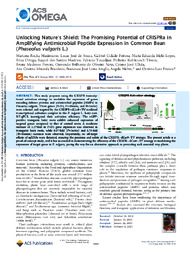Publications
Unlocking nature’s shield: the promising potential of CRISPRa in amplifying antimicrobial peptide expression in common bean (Phaseolus vulgaris L.).
Author(s): MAXIMIANO, M. R.; SOUSA, L. J. de; FEITOSA, G. C.; LOPES, M. E. M.; ORTEGA, B.; MADEIRO, R. dos S.; TÁVORA, F. T. P. K.; PEREIRA, B. M.; OLIVEIRA NETO, O. B. de; ULHÔA, C. J.; BRASILEIRO, A. C. M.; ARAGÃO, F. J. L.; REIS, A. M. dos; FRANCO, O. L.
Summary: This study proposes using the CRISPR transcriptional activation strategy to modulate the expression of genes encoding defense proteins and antimicrobial peptides (AMPs) in Phaseolus vulgaris. Three genes (PvD1, Pv-thionin, and Pv-lectin) were selected and targeted by the CRISPR–dCas9–TV-mediated transcriptional activation complex in the P. vulgaris L. hairy root. RT-qPCR investigated their activation efficiency. The eGFP-positive transgenic hairy roots exhibit enhanced expression of targeted genes compared to that of control roots. A moderate increase of 1.37-fold in PvD1 gene expression was observed in transgenic hairy roots, while 6.97-fold (Pv-lectin) and 5.70-fold (Pv-thionin) increases were observed. Importantly, no off-target effects of sgRNAs were detected, ensuring the precision and safety of the CRISPR–dCas9–TV strategy. The present article is a proof-of-concept study, and it has succeeded in demonstrating the efficiency of the CRISPR–dCas9–TV strategy in modulating the expression of target genes in P. vulgaris, paving the way for an alternative approach to protecting such essential crop plants.
Publication year: 2025
Types of publication: Journal article
Keywords: Phaseolus Vulgaris

